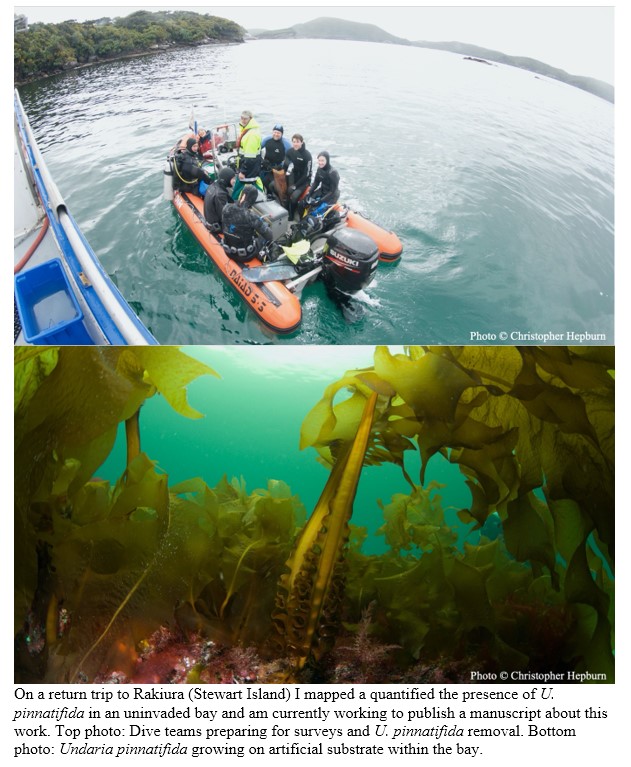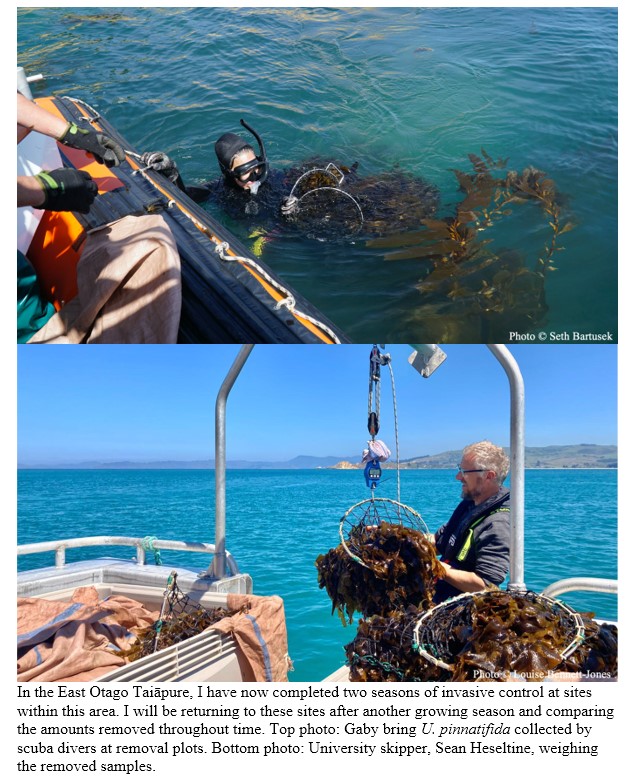Home Page
/images/AAUS/Headers/News_Articles.jpg
Diving Right In: Exploring Familiar Kelp Forests in Unfamiliar Places and Unfamiliar Times
Keeler-May, Gabrielle R.
Ph.D.
Candidate
Department of Marine Science
University of Otago, Dunedin, New Zealand
Doctoral Research Scholarship Recipient
2019
American Academy of Underwater Sciences
Kia ora! It’s been about 18 months since I began my Ph.D. journey in New Zealand, and if moving to the southern hemisphere wasn’t enough to flip my world upside-down, the pandemic certainly did. That probably rings true to most of you reading this, as 2020 has a been unquestionably, a roller coaster year. I aim for this article to be an exciting window into my research endeavors since being awarded the AAUS scholarship in 2019, but also need to acknowledge that I feel a deep sense of concern and discomfort in this present moment. It’s likely that I’m not the only research diver sitting in my home office wondering about the state of the rest of the world. As scientists, it’s within the wiring of our minds to be curious, ask questions and come up with methods and experimental designs to help us understand patterns we are seeing. However, most of what I’ve been doing during the pandemic is wondering and waiting, exploring the sea of thoughts in my mind while also trying to analyze data and write up my Ph.D. work that I began last year. With my research based in New Zealand, most of my immediate concerns about COVID-19 are alleviated but nonetheless, I can’t discuss my first year as a doctoral student without mentioning the pandemic and its impact

My research has taken me to some amazing locations so far. The University of Otago is situated within hours of all of my research sites. The east Otago coastline just outside my lab is full of wonderfully diverse seaweeds and marine life, and research trips to Rakiura (Stewart Island) and Fiordland are all within reach using our live-aboard research vessel, the Polaris II. Perhaps to some, fieldwork can sound adventurous and exciting (spoiler: it is!) and I’ve had the opportunity to get to some of the more difficult to reach places in New Zealand that many kiwis haven’t ventured to themselves. Yet, for every moment of astounding landscapes and clear water dives, reality certainly hits you when you realize you’re out of cheese and still have 3 more days of surveying (not too big a deal), or when you are halfway through a research trip and the generator set cuts out, so you have to coordinate a schedule out for when you can fill dive tanks and use the hot water (a much bigger deal). I wouldn’t be doing this work if I didn’t find it important and captivating though, and I definitely relish every opportunity that I have to see all the unique marine life that New Zealand has to offer.

The aim of my Ph.D. research is to gain a better understanding of the impacts or the invasive kelp, Undaria pinnatifida, in the rocky subtidal kelp forests of southern New Zealand. Specifically, my focuses are to compare invasive and native seaweed community contributions to the biomass of kelp forest ecosystems, to evaluate the distribution and expansion of Undaria, especially at sites of recent introduction, and to determine the impact of Undaria and its ability to resettle and recruit following removal through large-scale manipulations.
Some of the most valuable things I’ve learned so far is the importance of being adaptable and flexible to changing situations and allowing yourself the time and space to face adverse and everchanging conditions. While my proposed research project hasn’t changed much from what I originally set out to do, there have been plenty of opportunities where I’ve had to learn to make the most out of a situation and think quickly on my toes. Generally, this has happened when I’m aboard the boat with limited supplies and a short amount of time to come up with different methods after something has thwarted the original plan. Luckily, I’m surrounded by a strong group of supervisors, mentors, postdocs, technical staff, and lab mates who not only take the time to support and actively participate in my research, but also give me a strong sense of whāunau (community) and whanaungatanga (familial friendship), something I deeply cherish being so far from home. The importance of collaboration and teamwork is not lost on me, and I couldn’t do it without everyone who has helped me already along the way. I love that I’m working on a project where I get to engage with so many others and contribute to work that began before I arrived and will continue on after I’ve completed my doctorate.

I hope that wherever you are, you too are finding the time to continue to connect and work with each other, in a world where things seem very unfamiliar, disconnected and strange. I would again like to acknowledge and thank the scholarship committee at AAUS for choosing me for their 2019 doctoral research scholarship. I am proud to be supported by an organization that supports young and diverse underwater scientists. And congratulations to the most recent 2020 cohort of students who join me in receiving a research scholarship from AAUS!
Funding disclosure: my Ph.D. research is supported by the Department of Marine Science at the University of Otago, through the Ti Tiaki Mahinga Ka Partnership, which connects kaitiaki, scientists, and anyone who cares about mahinga kai (traditional food resources and their ecosystems) in New Zealand. In addition to funding from AAUS’s research scholarship, I’ve received additional awards from Te Rūnanga o Ngāi Tahu, Environment Southland and Refine Holdings Inc. LLC.